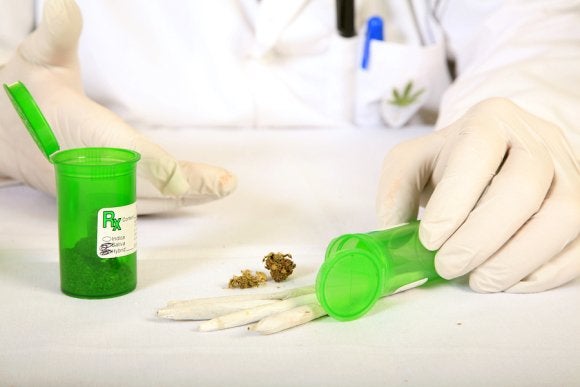-
What Maryland Physicians Need to Know about Medical Marijuana Regulations
In July 2014, the state’s Medical Marijuana Commission released its initial draft of proposed rules for physicians participating in the medical marijuana program in Maryland. Even though the commission’s efforts are receiving mixed reviews, feelings toward medical marijuana in Rockville are mostly positive. The commission published these draft rules to draw feedback from Maryland residents and organizations that are concerned with the structure of the state’s new medical marijuana system.
Training requirement
The commission’s proposed rules have drawn some criticism from a leading advocate. Del. Dan K. Morhaim, a Baltimore County Democrat and the General Assembly’s only physician, objects to the
draft regulations for requiring training and continued education in the medical use of marijuana for physicians interested in providing patients with access to the drug. Morhaim questions the need for requiring physicians to take periodic medical marijuana courses when there is no similar requirement for more dangerous prescription drugs. Morhaim and others fear that this proposed requirement would expose physicians to federal prosecutions and discourage participation in the program.
Feedback
Even though the continuing education requirement has drawn criticism, the commission’s draft rules have received mostly positive reviews. In 2013, the Maryland General Assembly passed regulations so restrictive that no Maryland patient was able to legally acquire the drug. The problem in the previous draft of regulations was restricting the drug distribution to the state’s academic medical centers, none of which showed any interest in participation. The 2014 version removes this barrier and allows nearly any licensed physician to prescribe medical marijuana . -
Understanding Maryland’s Medical Marijuana Regulations [INFOGRAPHIC]
There are 23 U.S. states that have laws legalizing medical marijuana, with the addition of Washington, D.C. and Guam. Maryland passed a medical marijuana bill in 2014 after much debate. Currently, there are not any medical marijuana dispensaries open in the state, but it’s expected that licenses will be granted in 2015. Neither patients nor caregivers are legally allowed to grow medical marijuana themselves; instead, it must be provided by a state-licensed dispensary. Growers must pay $250,000 for a two-year license, while dispensaries have to pay $80,000 for the same. Take a look at this infographic to learn more about regulations on medical marijuana in Maryland, and how they stack up to other states. If you are considering getting into cannabusiness, it’s easy to see why you need a lawyer with expertise in marijuana legalization in Rockville . Please share with your friends and business associates.

-
Can Medical Marijuana Help with Epilepsy?
Across the country, states have authorized medical marijuana prescriptions to patients suffering from debilitating conditions, including epilepsy, cancer and post-traumatic stress disorder. In 2014, Maryland passed legislation for marijuana legalization in Rockville and across the state. While researchers have focused their studies toward the effects of marijuana on adult patients, doctors are now prescribing medical marijuana to children with similar debilitating conditions.
As this CNN report illustrates, marijuana legalization has helped young patients suffering from catastrophic epilepsy. In particular, this video shares a father’s experience in administering a form of marijuana that doesn’t get his son high, but effectively treats his seizures. After switching from other medications to medical marijuana, this six-year-old patient was able to trade taking 22 pills per day to one a half marijuana pills per day. As a result, he is able to play, laugh and eat like other six-year-old boys.
-
Answers to Common Questions About Maryland’s Marijuana Regulations
On April 14, 2014, Maryland became the 18 th state to decriminalize possession of marijuana. Even though the District of Columbia joined in Maryland’s initiative of marijuana legalization, Maryland will be the first state in the Mid-Atlantic region to legalize medical marijuana. While members of the medical community have welcomed the news of this legislation, most people still have some logistical questions about medical marijuana in Rockville .
What did SB 364 do?
Prior to SB 364, possession of less than 10 grams of marijuana resulted in penalties of $500 in fines and up to 90 days in jail. SB 364 changes the criminal penalties for possessing less than 10 grams with a civil fine, similar to a traffic citation.Are there penalties for subsequent offenses?
While a first offense of possession of less than 10 grams of marijuana now results in a $100 fine, a second offense is punishable by up to a $250 fine. A third or subsequent offense can result in fines up to $500 and requires the offender to attend a drug education program and a referral to an assessment for substance abuse.
assessment for substance abuse. What are penalties for minors?
Minors have different penalties for possession of marijuana , so it’s important for minors to discuss these consequences with a criminal defense attorney. The punishment for minors possessing marijuana is similar to punishment for underage drinking and driving. A minor may be required to participate in a supervised work program, attend drug education programs, and forfeit his or her license for a certain time period.Is paraphernalia decriminalized?
While SB 364 does decriminalize marijuana possession, it does not address possession of drug paraphernalia. As a result, the penalties for possessing drug paraphernalia in Maryland remain the same.How can someone handle a marijuana charge?
SB 364 is a new Maryland law, so most people aren’t sure of their rights when facing marijuana possession charges. For this reason, it’s a good idea for someone charged with possession to consult with a criminal defense lawyer. A lawyer can help explain Maryland’s new laws in relation to a particular client’s case. -
What Do Prospective Dispensary Owners Need to Know About Maryland’s Medical Marijuana Law?
When lawmakers signed legislation to legalize medicinal marijuana in Maryland last April, they created deadlines for regulations to be completed. As a result, the Marijuana Policy Project became responsible for creating guidelines for licensing doctors, growers and distributors in Maryland. Even though the Marijuana Policy Project didn’t meet this deadline, they still currently offer guidance for new Maryland cannabusiness owners on how to meet state and federal obligations.
In October, the Marijuana Policy Project hosted an information seminar for prospective cannabusiness owners in Maryland. This seminar allowed physicians as well as prospective growers and dispensers to learn what was needed to obtain cannabusiness licenses. In this video, Rachelle Young of the Marijuana Policy Project and prospective cannabusiness owners describe their experience with the seminar and Maryland’s recently passed medical marijuana legislation.
-
Initiative 71 and DC’s Marijuana Laws
Last week, D.C. Mayor Muriel Bowser released several documents to help educate the public about DC’s Initiative 71 that legalizes posession of minimal amounts of marijuana for personal use.
- Frequently Asked Questions
- Initiative 71 Factsheet
- Initiative 71 Infographic
-
What Conditions Qualify for Medical Marijuana in Maryland?
On April 14, 2014, Governor Martin O’Malley signed two bills to finally provide qualifying patients with safe access to medical marijuana in Maryland . Last November, the medical marijuana commission set license fees for growers and dispensaries while developing rules for Maryland patients to receive medical marijuana. Once the regulations are approved, Maryland patients suffering from certain diseases will have access to legalized medical marijuana as part of their treatment.
Severe, debilitating or chronic pain
Chronic pain is among the list of conditions qualifying for treatment through medical marijuana in Maryland. Defined as pain lasting longer than six months, chronic pain is a condition in which signals of pain remain active in the nervous system. Common sources of chronic pain include headaches, joint pain, pain from injury and backaches. However, pain targeting certain body parts such as the shoulders and pelvis can also result in chronic pain. For many patients, chronic pain takes an emotional toll, as it can result in anxiety, stress, depression and anger.
Crohn’s disease
A type of Inflammatory Bowel Disease, Crohn’s disease is a chronic inflammatory condition of the gastrointestinal tract. Even though symptoms of Crohn’s disease vary by patient, symptoms often include persistent diarrhea, rectal bleeding, abdominal cramps, and fever. Many people who suffer from Crohn’s disease experience diminished appetite and weight loss. In turn, this can result in low energy and fatigue.Cancer
Research shows medicinal marijuana can help relieve pain, control nausea and vomiting and stimulate appetite in cancer patients. In addition, THC, the active ingredient in marijuana, can decrease pressure within the eyes, which can help reduce the severity of glaucoma. Some supporters of cannabis for cancer treatment claim that marijuana contains anti-bacterial properties, which can slow tumor growth and enlarge the airways.Multiple sclerosis
Multiple sclerosis is a debilitating disease of the central nervous system that disrupts the flow of information between the brain and the rest of the body. Medical marijuana in Maryland can help relieve symptoms associated with multiple sclerosis, including muscle stiffness, muscle spans, and overactive bladder. -
Timeline For Implementation Of New Regulations
On February 11, 2015, Hannah L Byron, Executive Director of the Maryland Medical Marijuana Commission presented a slideshow outlining the timeline for implementation of new regulations to the Maryland Senate. The slideshow includes the milestones and timelines for moving forward.
Click here to view the slideshow.
-
Examining the Issues Surrounding Cannabusiness Regulations in Maryland
In 2014, Maryland lawmakers voted to approve prescription of medical marijuana to certain patients. Currently, a Maryland commission is developing the logistics for licensing Maryland marijuana growers and dispensaries. In addition, the Maryland cannabusiness commission has drafted details of what growing and distributing medical marijuana will look like throughout the state.
The Maryland commission’s draft regulations address issues of prescribing medical marijuana to qualified patients, qualifications for people to grow marijuana, and prescription marijuana labeling requirements for dispensaries. Even though legalization of marijuana in Maryland has considerable support, people want to ensure that the state can successfully restrict access to minors. In the early days of Colorado’s medical marijuana legalization, security was a major issue for licensed marijuana facilities. Learning from other states’ experience in implementing medical marijuana laws, Maryland’s draft rules will require facilities to have security plans and to comply with training procedures and inspection schedules. Even though the commission detailing cannabusiness in Maryland is currently working on logistics, it is unclear when doctors, growers and dispensaries will begin receiving licenses.

-
What Decisions Do Cannibusinesses Need to Make to Set Up?
To take advantage of rapidly evolving Maryland marijuana laws and the expanding climate of acceptance regarding cannabis , prospective cannabusiness owners need to spend plenty of time planning how to get a foothold in this burgeoning industry. A medical marijuana lawyer can help new owners of marijuana dispensaries and other cannabusinesses make critical decisions regarding the formation of their new entities. First, entrepreneurs must decide exactly which type of business they wish to launch. The state will begin approving new growers and dispensaries.
Once entrepreneurs have chosen the type of cannabusiness they wish to pursue, they must plan the structure of their business. Like any other type of business, cannabusiness entrepreneurs must decide where to locate the place of business, how to obtain the proper licenses, how to remain in compliance with changing laws, how to supply the business, and how to address security concerns. Entrepreneurs will need to determine their business models and decide exactly how to run their companies, such as with a partnership or other entity.


